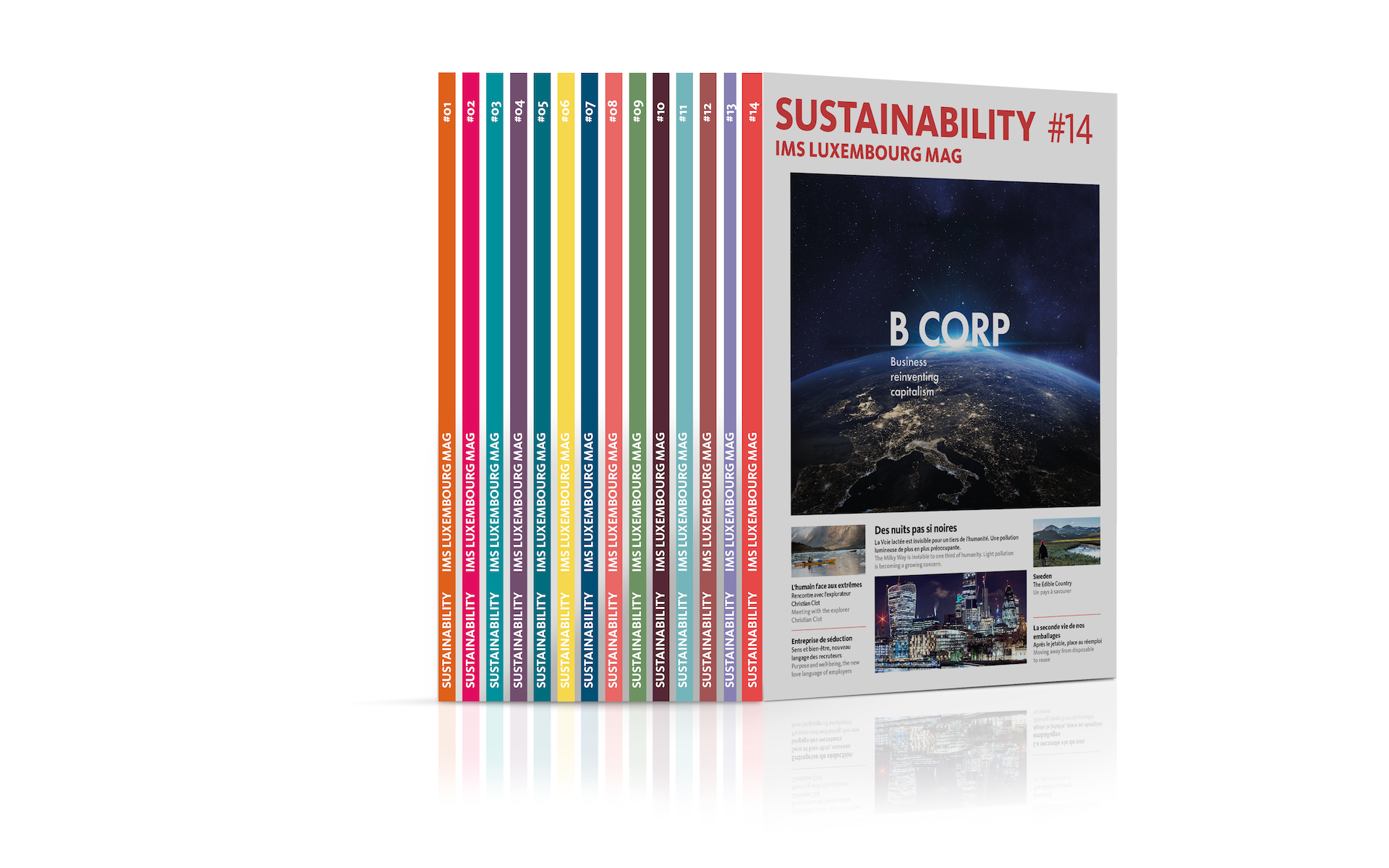"We are there to shake up the entire industry"
Questions to Pavithra Ram, Impact Navigator at Tony's Chocolonely

Want to bite into a chocolate without feeling complicit in the modern-day slavery of the industry? That's what Tony's Chocolonely is offering, as it claims to be "crazy about chocolate, serious about people". By passing (re)certification with flying colors, the Dutch company is one of the top B Corp performers and its governance has even been recognized as 'best for the world'. We spoke to Pavithram Ram to find out how good this chocolate is for everyone!
QUESTIONS
Sustainability Mag: How would you describe your business in a few words?
Pavithra Ram: Tony’s Chocolonely is an impact company that makes chocolate, not the other way round. We fight for more equality in the chocolate industry, and we exist to eliminate modern slavery in cocoa, not just in our chocolate but across all the chocolate worldwide.
You denounce the existence of modern slavery in the chocolate industry. How critical is the situation now?
Over 60% of the world’s cocoa comes from West Africa, more specifically from Ghana and Côte d’Ivoire. This cocoa is grown by smallholder farmers who are living in poverty. Between the millions of smallholder cocoas farmers and the billions of consumers, a handful of companies control the whole cocoa value chain and make massive profits. The price for cocoa is too low and the farmers cannot earn a living income. This poverty leads to issues, such as illegal labour, including child labour. A sector report that was published in 2020 revealed that 1,56 million children still are in child labour in cocoa in Ghana and Côte d'Ivoire. The latest Global Slavery Index also shows that about 30 000 people are in forced labour. That is modern slavery. These numbers are tragic. More than 20 years after the voluntary Harkin-Engel Protocol was signed, whereby large companies in cocoa promised to eliminate the worst forms of child labour in their supply chain, nothing has really improved. Something needs to change structurally and that is why Tony’s Chocolonely exists.

The chocolate industry's profits are unevenly distributed. This unequal value sharing is expressed in these chocolate tiles of various sizes.
Precisely, what solution does Tony's Chocolonely bring?
It is a two-fold solution.
One is to really change the way business is done. Tony’s Chocolonely applies its five sourcing principles. We source fully traceable cocoa beans, we pay a higher price for it, farmers are organised in cooperatives which fosters professionalisation and means they have a better bargaining power, we commit to the long-term with at least five years of sales, and we invest in quality and productivity. These principles are about bringing the structural systemic change that needs to happen at the very start of the cocoa chain.
Secondly, there needs to be pre-competition collaboration on cocoa. Our idea is: Let’s collaborate on cocoa, and let’s compete on chocolate. We invite other companies to join us on our mission, to use and follow our way of sourcing, and to collaborate to change the norms on the cocoa sector. This is called the Tony’s open chain, and recently, Ben & Jerry's joined us. Ultimately, the solution needs to be collaborative.
What triggered your ambition to become a B Corp?
We got certified in 2013 as the first European chocolate-selling company and as the second company in The Netherlands. The reason? Using “business as a force for good”, which is B Corp’s motto, is very much aligned with our own values. We also share this belief that collective action will bring systemic change and the B Corp movement is a strong rallying force for this. It is in line with our very mission that states: “Together, we want to make a 100% slavery-free chocolate”.
Actually, why should businesses who do good be labelled social enterprises? All businesses should be social enterprises. And those that are not should be called asocial or antisocial enterprises. Being a social company should be the norm.
How do you view the certification process?
After the initial certification, we went through two recertification processes. With this hindsight, I can tell you that this is a very rigorous process. Well, Tony’s Chocolonely has been mission driven from the start, which made it a lot easier because the company could show a Business Impact Model. But still, it made us look where else we could raise the bar. The different thematic pillars of the assessment make you look inward. Tony’s does things very well but there are many things we can improve on as well.
What was the biggest challenge during the recertification process?
As the company has grown a lot, a challenge was to align with the increasing number of internal stakeholders to get the information needed for the recertification. That was difficult but very interesting as well as this is a way to get the buy-in across the company. In that respect, the process is less complex for smaller companies.
What has joining B Corp changed in your sustainability approach? What did it concretely push you to change? Or more quickly?
The assessment has helped us look further into a couple of aspects, beyond our core mission. One is on our environmental footprint. Although we have long been combatting deforestation as it is a key cocoa-related issue, we were not so attentive to our scope 1 emissions. This is an aspect B Corp helps us look into in more details and this is something we are now working on, especially as our company is growing a lot. Another theme that we are now more focusing on especially in light of Tony’s workforce growth is diversity and inclusion. B Corp is providing us context and understanding when it comes to the hot topics and related expectations.
B Corp certification does not end when obtaining the label, it is all about continuous improvement. How do you make sure that B Corp requirements are embedded in every individual’s objectives?
Exactly. Certification is never a goal in itself, it is just a start, it is one step in the journey. In that regard, I consider the B Impact Assessment as a monitoring tool. I have a look at it regularly to see what the objectives and the gaps are, and then liaise with relevant stakeholders to make progress on specific objectives.
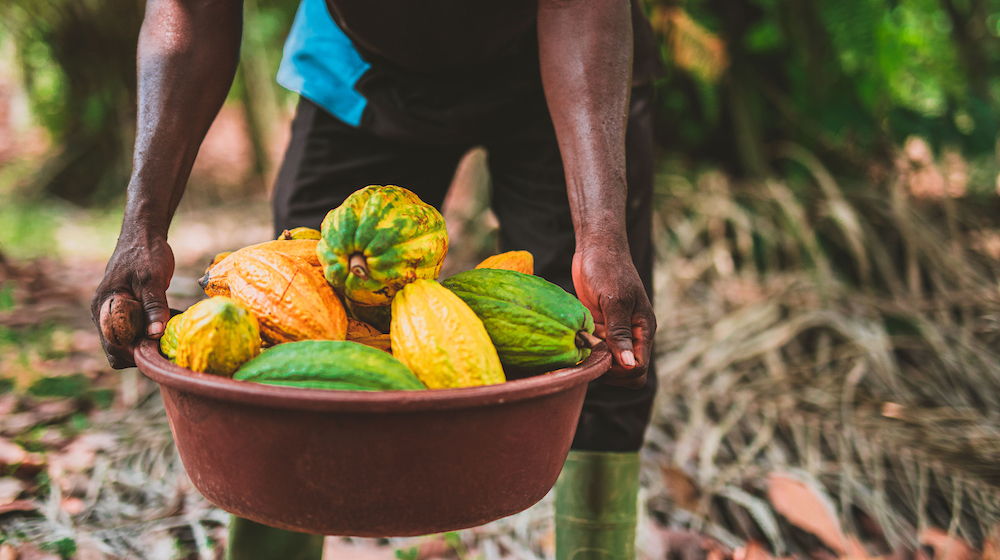
You have been awarded the “Best For the World” rating for the Governance Driver in 2022. How do you explain this achievement?
First, our mission is embedded in everything our company does. Everyone, from the sustainability team to the IT team, is working towards that same mission. Also, Tony’s Chocolonely is hugely transparent; it is a prerequisite as we are there to shake up the entire industry. We hold companies accountable, but we also hold ourselves accountable.
We are the first to acknowledge and transparently report in things we find in our supply chain because that is part of the due diligence process.
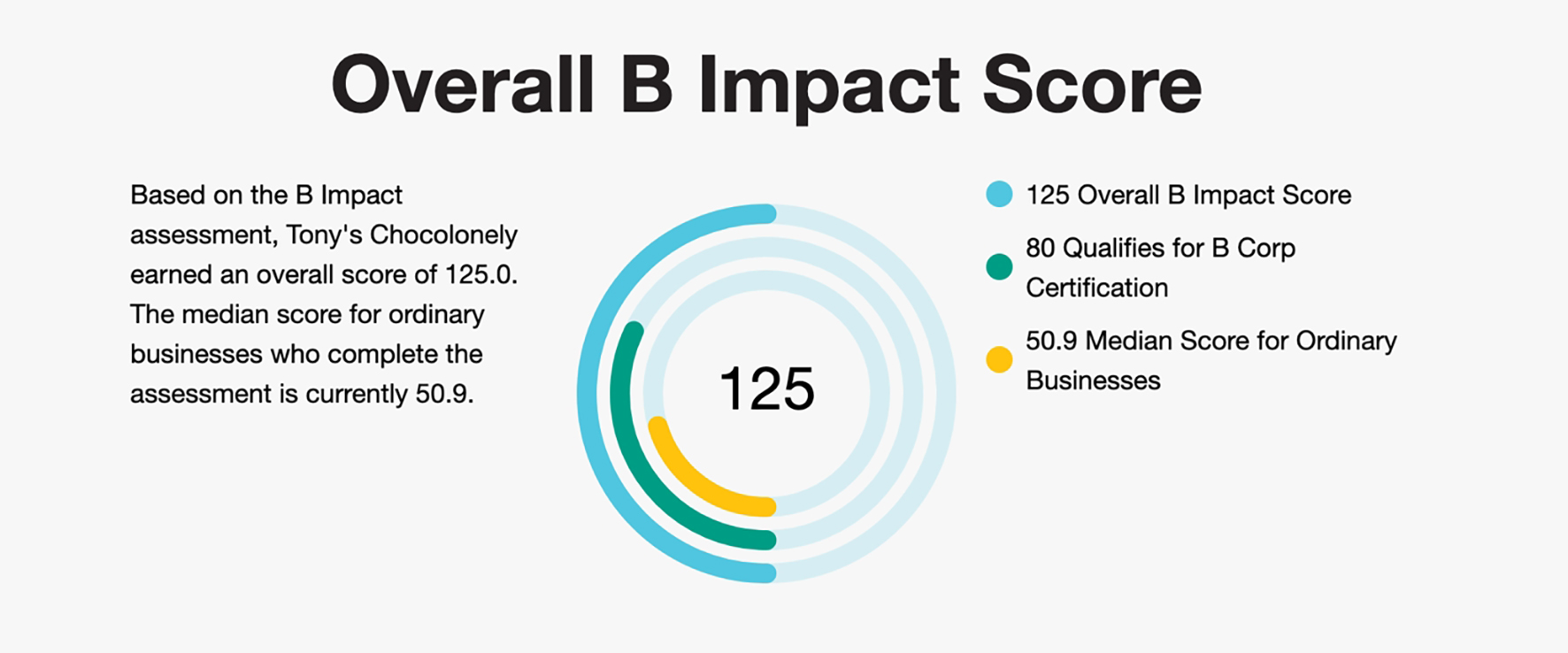
Tony's Chocolonely's overall score at the B Impact Assessment.
You are a founding member of the B Corp JEDI - Justice, Equity, Diversity and Inclusion - task force. Can you tell us how it works and what progress it provides for its participants?
It started with the Black Lives Matters movement in the spring of 2020. During a B Corp community meeting, a couple of companies asked what we could collectively do to address the issue. It really started out as a learning group. We were all in it, eager to change and know more. The JEDI task force idea is to make space for conversation, to organise masterclasses on Diversity and Inclusion topics, and to share best practices on recruitment.
There is a strong sense of belonging amongst B Corp companies. How do you make the most of this positive energy?
I always describe B Corps as a tribe of like-minded businesses. For example, a couple of years ago, we wrote a letter to a minister asking for a specific due diligence legislation. I went to fellow B Corps and asked them to sign the letter because a letter coming from several businesses together is much stronger than just one company trying to initiate that change. Also, through the B Corp interdependence coalition, we submitted a consultation to the EU parliament to discuss this legislation. This is what B Corp does, it sets the bar very high. And that is needed because we see far too many businesses trying to water down everything because it is in their interest. B Corp companies make sure that the interest is beyond our own.
How do you see the future of the B Corp movement?
I see it big, with larger companies joining the movement. We have seen that with companies like Danone or Nespresso. There are different points of views on the big companies joining. Some think it is watering down the certification. I have a different opinion; it is a rigorous certification process and B Corp is making sure that their certification is not another tool of greenwashing. I want as many companies as possible to join the movement.
Any recommendation for a company who wants to become a B Corp?
I would say patience, it is not an easy process. And having 100% buy in from the CEO to the intern. It really needs to come from within. That makes the process a lot easier.
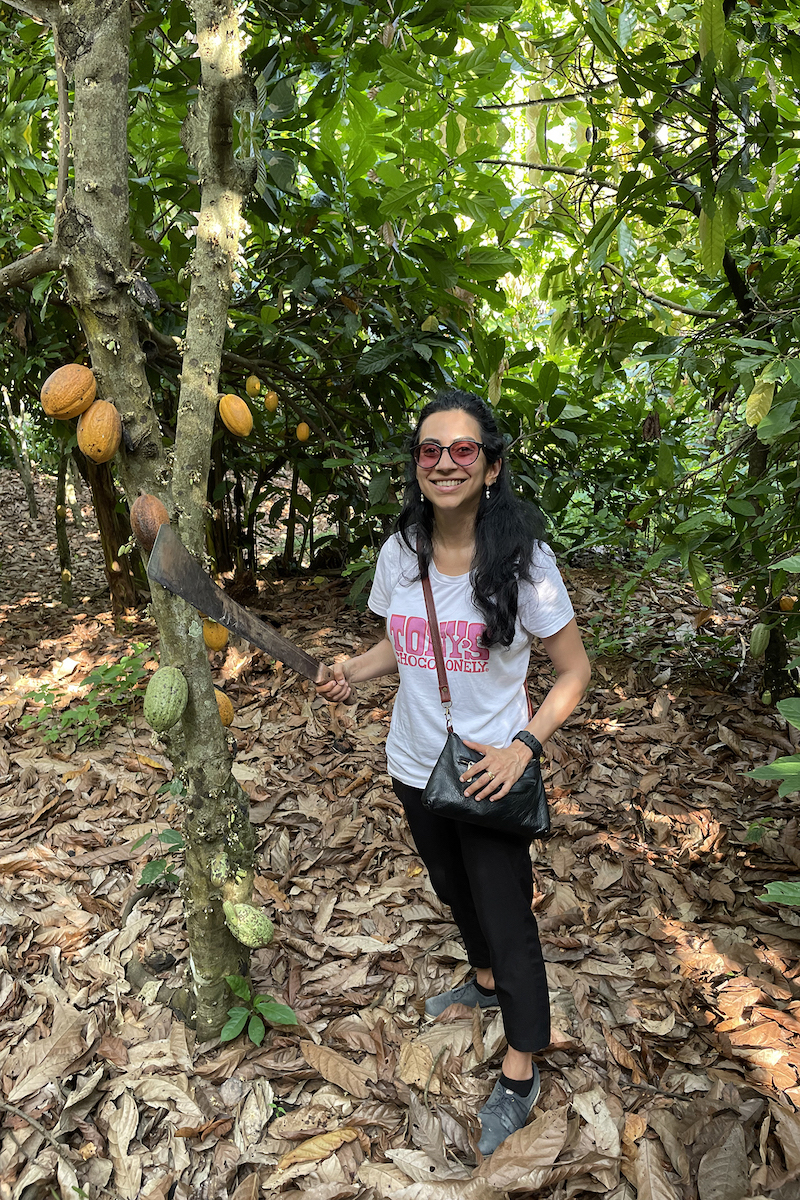
What are the next milestones to achieve on Tony’s Chocolonely journey?
Our company has gone from a start up to scale up phase now. I think the next milestone is to get other companies to join Tony’s Open Chain.
Besides, since our social mission is so much embedded in and we do so much on it, we would really want to go further on the environmental front as well. We are currently looking at how our climate strategy should evolve.
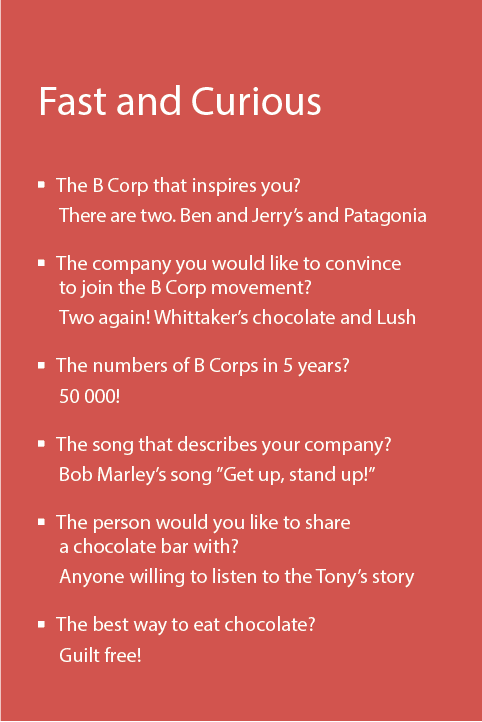
To be read also in the dossier "B Corp business reinventing capitalism"

